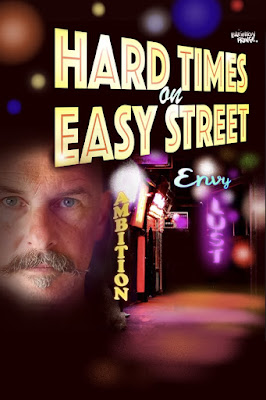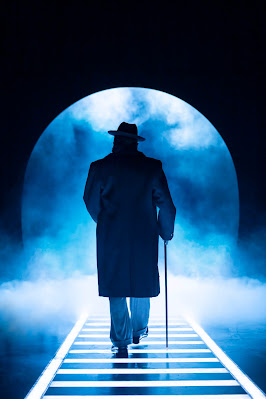Young Vic, London
*****
Music by Richard Rodgers
Book & Lyrics by Oscar Hammerstein II
Based on the play Green Grow the Lilacs by Lynn Riggs
Directed by Daniel Fish and Jordan Fein
 |
| Patrick Vaill |
In one of the most stunning interpretations of a Rodgers & Hammerstein musical to hit London in recent years, Daniel Fish’s interpretation of Oklahoma! crosses the Atlantic to open at the Young Vic. Fish developed his take on the show as a student production for Bard College in 2015. Three years later the show was to play Off-Broadway at New York’s St Ann’s Warehouse, before reaching Broadway in 2019 where it picked up eight Tony nominations with two wins including Best Musical Revival. Fish is accompanied at the helm by fellow director Jordan Fein.
Oklahoma! may hail from the Golden Age of Broadway but Fish’s vision is lean, simplistic and stripped back. Played almost in the round on a stage of bare timber, plywood and trestle tables, the only scenic enhancements are a sketched out backdrop of prairie farmland, with racks of rifles mounted high around the remaining the remaining three sides of the thrust performance space. Terese Wadden’s costumes are simple cowboy-chic with Levis de-rigeur for most, ranch chaps prevalent for the men and an array of purty frocks for the women as the scenes demand.
Amidst this simplicity of staging, the production has to stand solely on the strengths of its actors – and the troupe assembled here are amongst the finest musical theatre companies in town. Arthur Darvill and Anoushka Lucas lead as the hesitant lovers Curly and Laurey. Both are immaculate in their roles, with many of Curly’s numbers down sized to Darvill singing accompanied only by his own solo guitar playing. Powerful lighting plots wash some of the verses in The Surrey With The Fringe On Top and People Will Say We’re In Love into impassioned love scenes, never previously contemplated mid-number. It’s a bold move by the directors and lighting designer Scott Zielinski that is strikingly effective. There is boldness too in Daniel Kluger’s orchestrations of Richard Rodgers’ score that the Rodgers & Hammerstein Organisation have shrewdly seen fit to approve and which allows Musical Director Tom Brady to see his 9-piece band having more guitars than violins. With the musicians on stage, the new orchestrations give a powerfully Western twang added to the original, that only enhances the evening.
 |
| Arthur Darvill and Anoushka Lucas |
The musical magic of this production however lies not just in its leads, nor in its creative enhancements, but in the extraordinary talent assembled around them in the featured roles and here follows a roll-call of excellence.
Lisa Sadovy as Aunt Eller is everything her character should be – and then some more. Fish and Fein play fast and loose with the show’s structure and where we may have expected the first act to conclude with Laurey’s Dream Ballet, itself preceded by a soprano chorus singing Out Of My Dreams, it is Aunt Eller who here kicks off the second act of the show with that number, before the ballet gets underway. It’s an innovative shake-up of the show that works. And in mentioning the ballet, a note of massive praise to Marie-Astrid Mence who mesmerizingly dances the solo work.
Next up on this roll-call is Marisha Wallace as Ado Annie Carnes. Wallace is simply sensational. For sure, Ado Annie provides welcome moments of comic relief in the narrative but Wallace immerses herself in the woman to provide a portrayal of her character that is more fleshed out than the typical two-dimensional comic-book portrayals of Ado Annie, so often seen in the past. Not only is Wallace’s acting out of this world, her vocals take the Young Vic’s roof off too. One to watch for next year’s Olivier nominations.
Ranking alongside Wallace in talent and impact are two actors who have travelled with the show from Broadway. James Davis’ Will Parker is again a thoughtfully presented delivery of a comedy classic. Davis’ hapless bungling, matched only by his character's blinkered love for Ado Annie is simply a delight to watch.
Patrick Vaill has also crossed the pond with the show, with an even more intriguing pedigree connecting him to the production. His involvement incredibly dates back to 2015 when he was a student at Bard, creating this iteration of Jud Fry for Fish. Vaill’s Jud is extraordinary, taking this most complex of the canon’s villains and imbuing him with an unexpected tender sympathy. We find Jud to be “othered” by the community around him, culminating in his shocking death and while Jud clearly has a monstrous past, Vaill creates an intriguing, credible, complexity to the man, that has to be seen to be believed. Vocally magnificent too, Vaill’s turn leaves a deep and troubling imprint on the audience. A combination of contrasting light, blackout and video projections add an equally ingenious twist to the interaction between Curly and Jud.
Stavros Demetraki is a delight as pedlar Ali Hakim. His is a simple role to play in the narrative, oiling the story’s comedic wheels. Like all good comedy however, the role demands perfection in its timing and delivery and Demetraki hits his marks with pinpoint accuracy.
Another casting gem sees a grizzled Greg Hicks playing gnarled farmer Andrew Carnes, administering what Quentin Tarantino might have called 'frontier justice' in the show’s finale. It’s a troubling moment for the audience to reflect on, but Hicks delivers it with his hallmark first-class standards.
Producers Sonia Friedman and Michael Harrison have shrewdly backed this production, so one can only hope for its deserved West End transfer. Until then, at the Young Vic, Oklahoma! remains unmissable.
Runs until 25th June 2022
Photo credit: Marc Brenner



.jpg)






The%20End%20of%20the%20NightTHEEND_1.JPG)
















